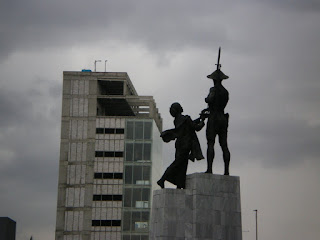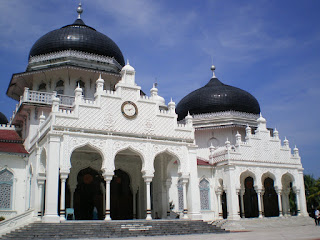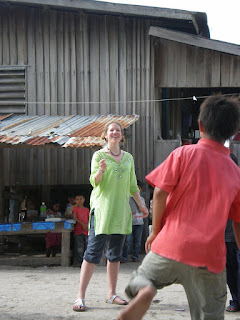It's 5.30 in the morning when I quietly leave the house and push my motorbike into the street. I chant my yogi protection mantra, (aad guray nameh, jugaad guray nameh, sat gureh nameh, siri guru deva nameh), because when you are driving a motorbike on Indonesian roads any protection is welcome. It is just getting light as I hit the road towards Merapi vulcano, winding through rice fields and small villages. It is nice and quiet for about an hour, but soon after that the road is more crowded than rush hour in Amsterdam. Everybody on the motorbike, some trucks and buses who can hardly climb the hills, and many old bikes, old rusty dutch grandma bikes creeping along the side. People on their way to work and to school. Nobody is worried about traffic safety and their children, I see kids of 6 years old driving a motorbike (brommer), they can barely touch the pedals.
I wind my way through the crowds and around deep potholes, sometimes stopping to ask the way, to go to the bathroom somewhere, to take a picture. When I buy gas it comes from the roadside, sold in 1 liter bottles from peoples houses, since gas stations are far from these small back roads. I take off my helmet and the local women and children get very excited about my arrival. A foreigner! With blond hair and on a motorbike! A crazy buleh going to Salatiga, which is far away. They sell me gas with big smiles and many thanks, the people on the road all watching and an excited bus driver hanging out the window. I am happy to wear my helmet with face covering when I drive, it keeps flies and wind and sun out of my face, and people don't notice me as much. Plus, this way I keep people surprised when I take it off!
I drive far and long, three hours, to get to Salatiga, which used to be an important Dutch trading and military town between Semarang and Solo in the middle of Java. Close to another volcano (Gunung Merbabu, the sister of Merapi) it is nice and cool. I am excited to see it, I have read so much about it, because it was here that the White Cross Agricultural Colony was founded in 1902 by the Dutch protestant Van Emmerik. He started it as a place for poor Javanese who had lost their land and houses in one of the frequent eruptions of one of the nearby volcanoes.
At the time Salatiga was flooded with begging and starving people and Van Emmerik, then working for the Salvation Army to bring Christianity to the Javanese, felt he had to do something. So he got land from the government and started his own colony and was soon joined by his Salvation Army english wife, Alice Cleverly-Van Emmerik. The colony grew enormously over the next 50 years, with two more colonies founded and about 1300 people living in the three combined. Besides giving land and food to poor Javanese they also raised thousands of orphans and hundreds of Javanese and some Indo-European juvenile delinquents. The last group is interesting for my dissertation about juvenile criminals and their re-education in the Netherlands Indies.
I could not believe my eyes last night when I decided to enter salib putih in google and actually found a website about the place. The internet is an amazing place to discover the world... So driving here I knew I was still going to find the place, which is more than I hoped for. It is still a christian enterprise, now an Indonesian association that is running an orphanage, a house for elderly people, some agriculture (coffee plantation mostly) and about 150 poor people still living and working there. It is 4 km out of Salatiga, towards the mountain and is green and lush with beautiful views all around. There is a campground and even a hotel, mostly to serve Christian gatherings. I manage to get a room and even get a 50% discount when I explain I am researching the history of salib putih. After a swim and a nap to recover from my drive I explore the place, the village, some of the old houses and storage rooms still there. The place is silent, only some road noises, and it must have been dead silent before cars and motorbikes became prevalent here. The peaceful atmosphere is wonderful and a bit creepy in the dark parts of the forest and coffee plantations. So much history, the feeling of all of it overwhelms me sometimes.
An elderly woman invites me into her home, and I meet her even older mother Ibu Iyem inside. She is 97 years old and says she used to work for the Van Emmeriks until WW II. She is very confused and also cries a lot, which makes me wet-eyed too, and I soon give up the idea of interviewing here. They ask me to read from the bible in Bahasa Indonesia, because they can not read the small print any more. I end up doing it, reading words I don't understand but trying to fill them with my love and devotion for the One who does not care about religion anyway....
Their tiny house has three pictures of Jesus and they give me sweet Lemonade to drink. I am worried about the water they made it with, is it clean? I drink it anyway but manage to refuse the food by saying I have already eaten... better safe then sorry... The house is small and dirty and I am not sure if they have a fridge. The Ibus (mothers) also ask for money, which I kind of expected. I am white so I am rich, is their reasoning, and I understand this. I am rich, it is true.
Their story is very sad, because the old lady has a tumor and needs an operation which they say they can not afford. But at the same time I am not sure. I am overwhelmed by their crying and emotions and their sad story. But Ibu Mimi, the younger one, also has a son and family in Bogor and he has a job in Jakarta. So I ask here why he is not helping them. She does not really answer. I ask his number to discuss it, thinking I would not mind paying for the operation, if it is really needed. But would they not take care of it here? This is still a colony for poor people so you would think health care is included...
I am thinking about ways to raise money for Ibu Iyem, and I feel so sad for their sadness and pain, when I run into Dimas who works at the reception of the hotel I stay at. He also invites me in his house and I meet his little son and father-in-law. Dimas speaks a bit of English and wants to practice. I like him immediately, he just feels right. So I ask him about the situation on the colony and he tells there is a lot of poverty, the association does not have much money. But a nurse checks on patients every day and if needed they are sent to the hospital for whatever treatment they need..... this is what I felt when talking to the Ibus. They are sweet women and I am sure they need money, but it is not for an operation I am afraid. I still don't know what to do, I would like to help them, but it is complicated in a village like this. Everybody needs money. Where do I start? And is money the answer? I guess this is a question only rich people have the luxury of asking...
Dimas knows a lot about the colony and shows me around. We walk in a down pour of tropical rain, our umbrellas protecting our upper bodies but my dear Birkenstock sandals are immediately wet. The mud path over the plantation is soon a river and I am envious of his rubber slippers. The graveyard looks like a shipyard of crosses in a sea of grass, trees looming large, jungle reclaiming some of the graves. The Van Emmerik's lie side by side in big stone tombs, their flock around them. I find old graves and new graves, and everything in between, a history in names and dates. I also see the old prison, which is converted into a house now. The back side is intact, with the three small barred windows, exactly like I read in my sources. Many of the children sent to Salib Putih were put here for a few hours or days for stealing, running away, and other sins....
It is strange to see and feel the place like this, everything so real. We also visit some old houses and rice storages, and the ruins of the house where the Van Emmeriks used to live. The only recognizable elements are the small stone steps leading up to what used to be the veranda. "Mother" Van Emmerik writes about the people who would come to her door and sit on the step, asking to be accepted at the colony, or bringing a child or family member that was sick or dying. She always accepted people, even if everything was full and the prison had to be used as a temporary house during those times. At the height of the depression in the 1930s over a 1000 people were living on this colony. Some staying in family homes, and others in the big dormitories for the boys and girls without family. Delinquents were living together here with their 'normal' orphaned peers, something that was unheard of in the government juvenile institutions but allowed here.
Ma van Emmerik wrote about 'her' people every month in a little magazine she kept for donators and supporters. She writes about their lives with a mix of love and compassion, racism and orientalism, patronizing judgment and sometimes despair. Always hoping for them to become Good Christians, always hoping for them to become Good People. The ones who work hard are being praised, the ones who don't are still being fed but are constant sources of worries. Disease and death is rampant and the obituaries she writes for the death are often touching. Throughout the stereotypes about 'lazy and lying Javanese' and underneath and in between the racism, there is always love and compassion and an urge to serve and to rescue.
Yes, this is what I am seeing and feeling strongly by being here, these people were trying to serve and support their fellow human beings, their brothers and sisters, who they also looked down on, who they wanted to bring to Jesus so bad that it hurts to read it. What can I say? It is a complex history. Many of these Christianized Javanese became estranged from their Muslim family or village and they were instilled and 'cultured' and educated in Western ways without ever being asked. But they also got a change to get an education, to eat every day, to have a roof above their head, and in the case of juvenile delinquents: to be relatively free and live with their peers. Many of the delinquents ran off, but many also went to school and married and had babies and some of their offspring is probably still around today.
Tomorrow I will ask Dimas what he thinks about this. He is a Christian, how does he feel about the history of his own home? Today we ended the day on a lighter note. After walking in the rain we took his son and 2 little cousins and picked up his wive from work in town and I took them all to dinner in a local warung makan. Nasi goreng with some raw cabbage and cucumber and the hot sweet tea they serve here. It was a feast, and I felt among friends. I taught the children some Dutch and English songs and they taught me Indonesian words. We joked and we laughed, enjoyed the fod and each others company, and just smiled a lot.














































